The good thing about vacation is that time off is essential. The bad thing is the reentry, which, lately, is harried enough to induce arrhythmia. Almost. Thankfully, I made it through the reentry week and now sit in peace on Saturday morning with my MacBook. I thought I would tell you a little about my unplugged vacation—mostly the book reading.
You have to understand that I am behind in my education. While many of you were reading classic books, writing papers, learning grammar and becoming educated, I was playing sports, memorizing science, excelling in math and then, later in life, learning only medicine. I kick myself now about this. Instead of spending hours shooting buckets, I could have been reading.
So when we go on vacation, I use the disconnect to catch up. In cycling terms, I am a mid-pack Cat-4 in literature.
This summer we went on a family cruise to the Caribbean. Cruise boats do indeed have ‘wee-fee,’ but at $5000 per minute, the cost is prohibitive. And this is a damn good thing. One negative about the disconnect, though, was that we left during the third week of the Tour. But we didn’t miss much. Nibali made it a no-contest, just as Lance used to.
Three things about cruising, then the books:
Our family likes cruises because everyone can do their own thing. There is no cooking, food/drink comes on a schedule, and the service is good—though the working conditions of the staff is a little unsettling.
Another misconception about cruising is that it’s easy to gain weight. Not for me; I went to the vast fitness center twice daily, lifted weights and stretched. And with all the food available, I was able to choose good foods, like fruits and veggies. I came back fit or fitter than when I left.
As a lead-in to the book review, I should direct you to this David Foster Wallace masterpiece on cruising. If you have ever been on a cruise, his words will make you tingle with delight. It’s sad that DFW is gone. He was an amazing writer and had striking powers of observation.
Now to the books:
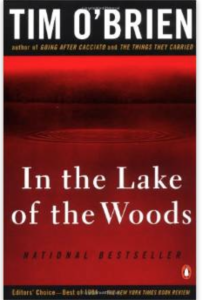 Tim O’Brien is a Vietnam veteran and writer. His most famous book was Things They Carried, which I have read previously. This week I chose In the Lake of the Woods, a 1995 novel set in both Minnesota and Vietnam. When I read Tim O’Brien, I feel as though I am learning about the time, the human effects of war and, also, the blur between fiction and reality. They did not call it PTSD in 1995, but surely the protagonist John Wade suffered from it. You simply cannot read the work of veterans, like Mr. O’Brien, and still feel the same about sending babies to war. One other thing: I love his writing style.
Tim O’Brien is a Vietnam veteran and writer. His most famous book was Things They Carried, which I have read previously. This week I chose In the Lake of the Woods, a 1995 novel set in both Minnesota and Vietnam. When I read Tim O’Brien, I feel as though I am learning about the time, the human effects of war and, also, the blur between fiction and reality. They did not call it PTSD in 1995, but surely the protagonist John Wade suffered from it. You simply cannot read the work of veterans, like Mr. O’Brien, and still feel the same about sending babies to war. One other thing: I love his writing style.
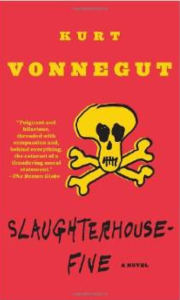 Kurt Vonnegut is…well…Kurt Vonnegut. My favorite thing about Slaughterhouse-Five was that it was the only book that my son Will (a 36-ACT guy) also read during the trip. And he loved it too, especially the part about Tralfamdore. I didn’t know beforehand that both these books would deal so centrally with the post-traumatic stress of war. So it goes.
Kurt Vonnegut is…well…Kurt Vonnegut. My favorite thing about Slaughterhouse-Five was that it was the only book that my son Will (a 36-ACT guy) also read during the trip. And he loved it too, especially the part about Tralfamdore. I didn’t know beforehand that both these books would deal so centrally with the post-traumatic stress of war. So it goes.
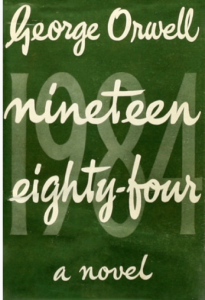 I’m slightly embarrassed to admit that before this vacation, I had never read George Orwell. My friend and colleague Dr. David Mann recently wrote that he thinks 1984 should have been titled 2014. Some might consider this hyperbole, but as I was reading the saga of Winston Smith, I kept thinking of our medical culture. Though Big Brother applies most aptly to political policy, the idea of thoughtcrime also applies to the modern-day medical machine. Don’t even think statins, TAVR, MRI-safe devices and the like have downsides. Don’t dare question the American Board of Internal Medicine. Do the safety modules, check the boxes, obey the guidelines. As Winston Smith wrote in his diary: “Thoughtcrime does not entail death. Thoughtcrime is death.†I am going to have to read 1984 again; it was a lot. I hope also to find time to read Hitchens’ Why Orwell Matters.
I’m slightly embarrassed to admit that before this vacation, I had never read George Orwell. My friend and colleague Dr. David Mann recently wrote that he thinks 1984 should have been titled 2014. Some might consider this hyperbole, but as I was reading the saga of Winston Smith, I kept thinking of our medical culture. Though Big Brother applies most aptly to political policy, the idea of thoughtcrime also applies to the modern-day medical machine. Don’t even think statins, TAVR, MRI-safe devices and the like have downsides. Don’t dare question the American Board of Internal Medicine. Do the safety modules, check the boxes, obey the guidelines. As Winston Smith wrote in his diary: “Thoughtcrime does not entail death. Thoughtcrime is death.†I am going to have to read 1984 again; it was a lot. I hope also to find time to read Hitchens’ Why Orwell Matters.
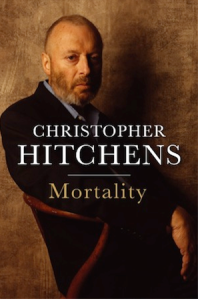 Once I start reading Christopher Hitchens, I can’t seem to stop. Agree with him or not, this man could think, write, and provoke. Mortality is a compendium of essays Hitchens wrote while stricken with metastatic esophageal cancer. He died in 2011. I read the 100-page book in one sitting. Though he remained steadfast in his life-prolonging goals, he was Hitchensesque in describing his illness and its treatment: “The oncology bargain,†he wrote, “is that, in return for at least the chance of a few more useful years, you agree to chemotherapy and then, if you are lucky with that, to radiation, or even surgery. So here’s the wager: You stick around for a bit, but in return we are going to need some things from you. These things include your taste buds, your ability to concentrate, your ability to digest, and the hair on your head.â€
Once I start reading Christopher Hitchens, I can’t seem to stop. Agree with him or not, this man could think, write, and provoke. Mortality is a compendium of essays Hitchens wrote while stricken with metastatic esophageal cancer. He died in 2011. I read the 100-page book in one sitting. Though he remained steadfast in his life-prolonging goals, he was Hitchensesque in describing his illness and its treatment: “The oncology bargain,†he wrote, “is that, in return for at least the chance of a few more useful years, you agree to chemotherapy and then, if you are lucky with that, to radiation, or even surgery. So here’s the wager: You stick around for a bit, but in return we are going to need some things from you. These things include your taste buds, your ability to concentrate, your ability to digest, and the hair on your head.â€
For Hitchens, it was reasonable trade, but after reading on, one sees why it is so important that patients understand the details of the treatment bargain—it is no small thing prolonging death in end-stage disease. This should be a must read for doctors treating patients at end of life.
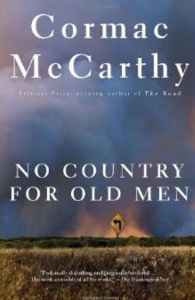 Cormac McCarthy has been called the greatest living American writer. I have previously read The Road, and this time chose the new-age Western, No Country for Old Men. Again, I’m so art-starved that I had not realized this was made into an award-winning movie in 2007. While reading one particularly suspenseful scene, I actually got a visceral reaction. McCarthy’s words do that. Another message from the dark novel: drugs are so very dangerous. My parents instilled in me a fear of drugs. McCarthy’s words, and the daily news, reinforce those warnings. Be afraid–of drugs.
Cormac McCarthy has been called the greatest living American writer. I have previously read The Road, and this time chose the new-age Western, No Country for Old Men. Again, I’m so art-starved that I had not realized this was made into an award-winning movie in 2007. While reading one particularly suspenseful scene, I actually got a visceral reaction. McCarthy’s words do that. Another message from the dark novel: drugs are so very dangerous. My parents instilled in me a fear of drugs. McCarthy’s words, and the daily news, reinforce those warnings. Be afraid–of drugs.
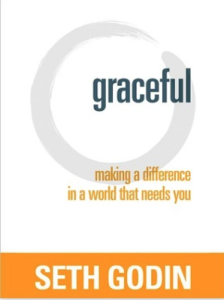 Almost every morning on the way to work, I talk to myself: be Graceful, John. I follow Dr. Bryan Vartebedian on Twitter, and he often tweets nuggets of wisdom from entrepreneur and author Seth Godin. The 32-page e-book reminds me of my all-time favorite book: It’s Easier Than You Think, by Sylvia Boorstein. Both authors tell us what we know: that grace and kindness are a choice we make. For me, and maybe for you, grace is something that requires constant practice. Some day I may get there, but that road is a long one. My staff and co-workers can testify to that.
Almost every morning on the way to work, I talk to myself: be Graceful, John. I follow Dr. Bryan Vartebedian on Twitter, and he often tweets nuggets of wisdom from entrepreneur and author Seth Godin. The 32-page e-book reminds me of my all-time favorite book: It’s Easier Than You Think, by Sylvia Boorstein. Both authors tell us what we know: that grace and kindness are a choice we make. For me, and maybe for you, grace is something that requires constant practice. Some day I may get there, but that road is a long one. My staff and co-workers can testify to that.
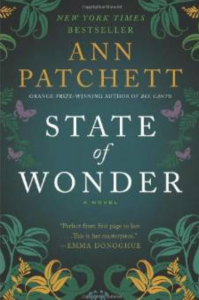 The last book I read was my favorite. Ann Patchett is another beautiful writer. State of Wonder had me most enthralled. So good was this novel that even noise in the supposedly noise-free boat library did not rile me. The recent news on the Ebola virus has brought the once-distant world of tropical medicine to the fore. This was a story of medicine, academic hierarchy, big-pharma, rain-forest drama and humanity. The novel reminded me of Abraham Verghese’s Cutting for Stone—a book that reinvigorated my love for the bedside aspects of medical practice. Medical person or not, I am confident that State of Wonder will impress you, too.
The last book I read was my favorite. Ann Patchett is another beautiful writer. State of Wonder had me most enthralled. So good was this novel that even noise in the supposedly noise-free boat library did not rile me. The recent news on the Ebola virus has brought the once-distant world of tropical medicine to the fore. This was a story of medicine, academic hierarchy, big-pharma, rain-forest drama and humanity. The novel reminded me of Abraham Verghese’s Cutting for Stone—a book that reinvigorated my love for the bedside aspects of medical practice. Medical person or not, I am confident that State of Wonder will impress you, too.
It was a great vacation. I feel both rested and smarter.
JMM
2 replies on “A vacation book review…”
Glad you had a great vacation that got you away from “the usual matters”. Sounds enlightening! – : )
The most amazing thing about this post…is that you read 7 books in a week!
That would take me 7 weeks minimum. I’m calling my wife now book a seven week vacation just to keep up!
I love the analogy between 1984 and modern medicine. I also loved Orwell’s Animal Farm – only about 100 pages. Sounds like you could read that instead of the paper one morning.